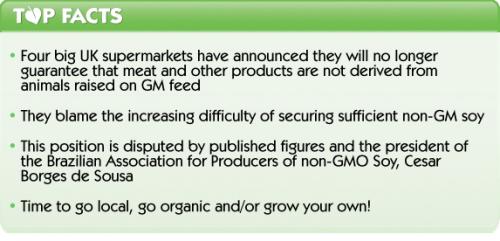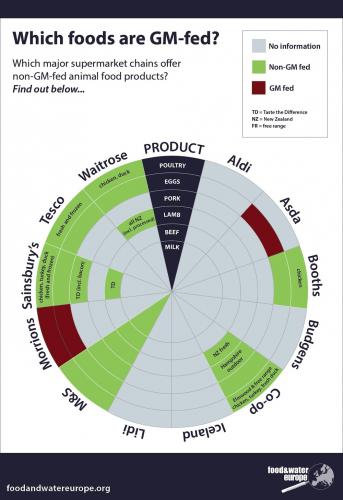With one exception, British supermarkets are no longer guaranteeing that their poultry isn’t fed on genetically modified (GM) feed. Why are customers’ wishes being ignored yet again?
Tesco takes the lead
At the end of last week, UK-based supermarket giant Tesco announced that it was joining Asda and Morrison’s and abandoning its policy of sourcing poultry fed exclusively on non-GM feed. The company’s statement attempted to justify its clear betrayal of its customers’ wishes by blaming the change on Tesco’s suppliers and farmers. Widespread reliance on GM varieties of soy – “The best source of protein to feed livestock” according to Tesco – and pollution of non-GM soy with GM material are making it, “Increasingly difficult for them to guarantee that the feed they use is entirely GM free”.

Supermarket sheep
After allowing that announcement to sink in over the weekend, three more of the UK’s largest food retailers declared that they were following suit. Sainsbury, the Co-operative and Marks & Spencer will continue to stock non-GM, organic animal products, with Sainsbury also offering a few more non-GM options.
Race to the bottom
To what degree these new policies represent a change of course for the companies involved is clear from the diagram below, which shows the situation prior to the recent changes. It marks a complete reversal of policy for Marks & Spencer and a fairly major shift by both the Co-operative and Sainsbury, leaving Waitrose as the only UK supermarket with a principled position against GM. Worst of all, mandatory labelling of foods containing GM ingredients in the European Union (EU) doesn’t extend to products derived from animals fed GM feed. Unsuspecting Brits, saddled with a slavishly pro-GM establishment, are now forced to wander a featureless GM food desert to find the shrinking oases of unmodified animal products.

Source: Food and Water Europe
Health risks ignored
Predictably, Tesco points to the UK Food Standards Agency’s (FSA) opinion that, “Food from animals fed on authorised GM crops is considered to be as safe as food from animals fed on non-GM crops”. As an agency of a pro-GM government, however, the FSA blithely ignores the mounting evidence that this reassuring picture is utter nonsense. Since animals fed GM feed can develop multiple health problems, up to and including cancer, it begs the question about how safe it is for humans to consume products derived from those unhealthy animals. Several studies have demonstrated the potential for flow of GM material, such as proteins, from the guts of animals fed GM feed to animal products consumed by humans, such as meat and milk. More worryingly, the possibility also exists for so-called horizontal transfer of foreign genes to humans. Even research commissioned by the GM-loving European Commission has identified alterations in immune system components in animals fed GM feed, although the authors downplayed the significance of their results.
Brazilian backlog
The story took an interesting twist with the release of a statement by Cesar Borges de Sousa, President of ABRANGE, the Brazilian Association for Producers of non-GMO Soy. Professing himself “puzzled” by the UK supermarkets’ decision to ditch non-GMO soy, Mr de Sousa said that, “The current situation...has nothing to do with the soy being GMO or Non-GMO; it is the result of a slow down in Brazilian exports...caused by increased demand...There is a shortage of berths for mooring ships in virtually every Brazilian port. In some cases, ships must queue for 30–40 days just to dock and load.” According to ABRANGE, UK supermarkets may be overly reliant upon a single supplier that has decided to discontinue non-GM soy: “This change could well have as much to do with interest in opening the UK to imports of GM soy from the USA than to the temporary slow down in Brazil”. And who’s the major US supplier of GM soy? It is, of course, Monsanto, but it’s unclear whether the company – or one of its subsidiaries – has been supplying non-GM soy to UK supermarkets. Furthermore, published figures support the Soil Association's Peter Melchett when he says that there is plenty of non-GM soy to go around.
GM pollution – or polluters coming clean?
Looking at the big picture, it’s difficult to escape the conclusion that we’re looking at one of two things. Either it’s an attempt by the biotech companies and their bureaucratic enablers to irreversibly pollute the food supply with GM – or, in the worst-case scenario, we are being presented with an ongoing, stage-managed revelation that GM is already ubiquitous in the supply chain. Either way, the end-game is the same: to sidestep public disdain for GM by convincing everyone that it’s too late to do anything about it. The solutions are increasingly simple and stark, as shown in our ‘Call to action’ below: go local, go organic and/or grow your own!
Call to action
- If you have any spare land – be it your back garden, an allotment or something larger – it’s time to seriously consider turning some or all of it over to growing your own vegetables. There are some innovative solutions even for those with very limited space, some of which have enormous potential for urban food production. Also think about getting some chickens for GM-free meat and eggs
- If you’re going to grow your own, educate yourself about organic farming techniques. There are plenty of great books out there, and courses are becoming more plentiful all the time
- Join an organic box scheme and have your own food, and even that of your pets if you are so inclined, delivered to your door. UK box schemes can be found here. Along with organic fruit and veg, grass-fed, organic meats and other animal products exist via delivery schemes such as Eversfield. While the UK supermarkets betrayal of British consumers is despicable, a possible silver lining is that they may have shot themselves in the foot. The likely increasingly healthy bottom line among these organic suppliers will give us some measure of the market share the supermarkets are set to lose
- Remember: at present, EU organic standards forbid the use of GM, although contamination is tolerated up to 0.9% by weight. Other than this, organic food sold in supermarkets should, for the time being, be OK. However, given how untrustworthy they have shown themselves to be, it is our view that reducing dependency on the unscrupulous supermarkets identified in this article may be one of the best decisions you can make for your long-term health – as well as that of any children in your care.








Comments
your voice counts
18 April 2013 at 10:05 am
How about Waitrose, that is slightly less low-end market?
18 April 2013 at 10:50 am
Dear Max, you may have missed this sentence: "It marks a complete reversal of policy for Marks & Spencer and a fairly major shift by both the Co-operative and Sainsbury, leaving Waitrose as the only UK supermarket with a principled position against GM". As you can see from the diagram in the article, Waitrose still guarantee their poultry, eggs and lamb are from animals fed non-GM feed.
18 April 2013 at 2:48 pm
JSymonds You don't mention ASDA & Iceland (though I don't use the latter as it's seem like wall to wall junk food [mostly] & I've never found any organic veg there); also how can those of us on Uber low incomes & nowhere to grow anything manage?
18 April 2013 at 4:52 pm
Hi there, both Asda and Iceland are on the diagram we included in the story. We also included a link to an item about 'vertical hydroponics', which are useful for people living in limited space; Mother Earth News has some great ideas - http://www.motherearthnews.com/city-farming/six-ideas-for-small-space-gardening.aspx#axzz2QpJqqGig - and there's plenty of info on the Internet: https://www.google.co.uk/search?q=gardening+limited+space&ie=utf-8&oe=utf-8&aq=t&rls=org.mozilla:en-US:official&client=firefox-a. In our experience, using one of the box schemes we linked to in the article is usually cheaper than shopping at a supermarket. So no need to despair!
Your voice counts
We welcome your comments and are very interested in your point of view, but we ask that you keep them relevant to the article, that they be civil and without commercial links. All comments are moderated prior to being published. We reserve the right to edit or not publish comments that we consider abusive or offensive.
There is extra content here from a third party provider. You will be unable to see this content unless you agree to allow Content Cookies. Cookie Preferences